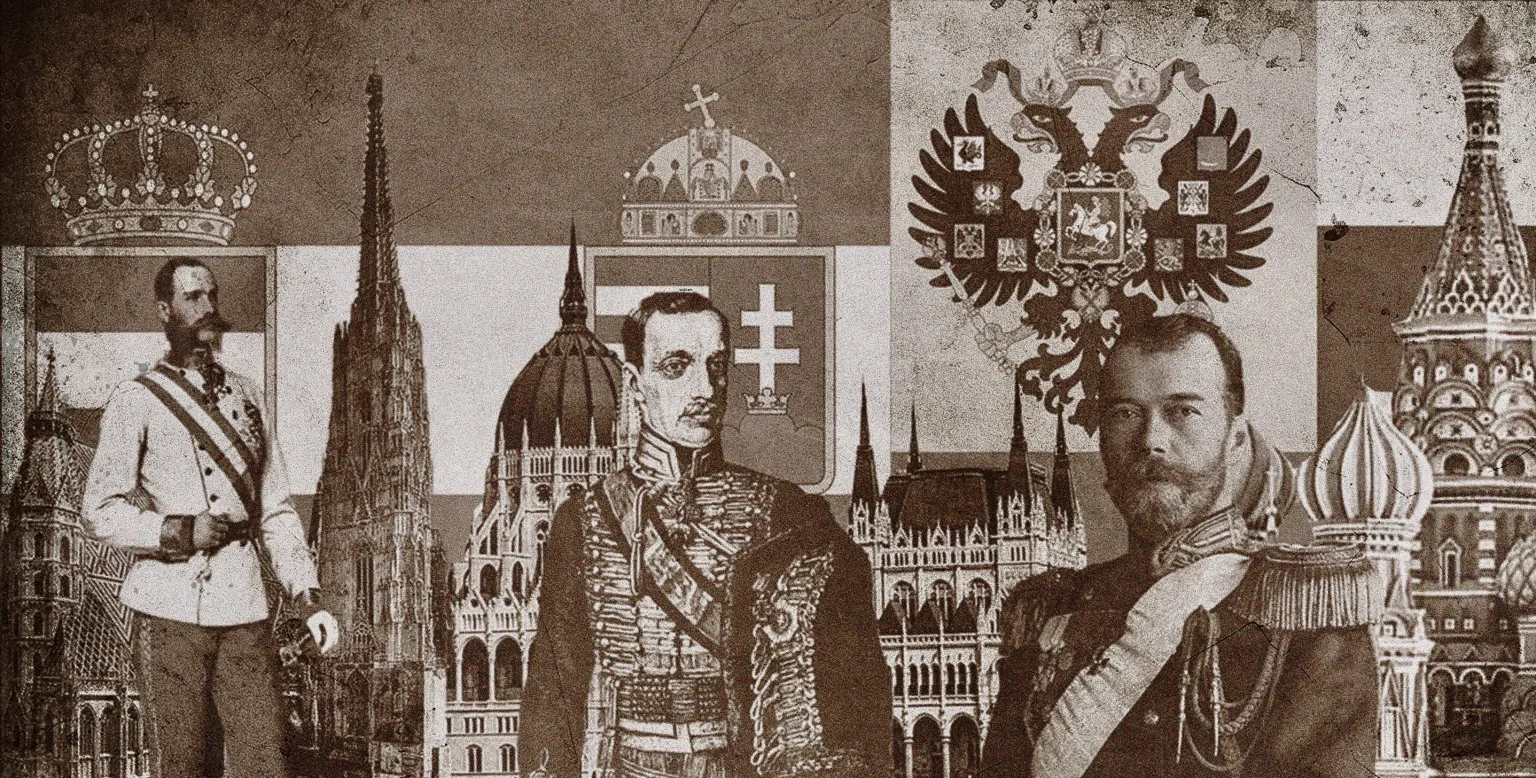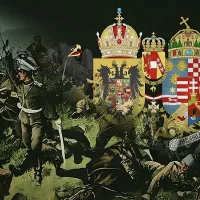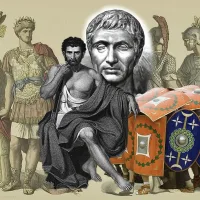In the intricate tapestry of European history, the threads of alliances, betrayals, and geopolitical strategies have woven together the destinies of nations. One such thread, often overlooked, is the potential alliance between Austria-Hungary and Russia. What if, in a twist of fate, these two empires had joined forces, sidelining Germany in the process? This article delves into this tantalizing “What If” scenario, offering a balanced exploration of the potential outcomes, both positive and negative.
A New Balance of Power
At the heart of Europe, Austria-Hungary’s dual monarchy was a melting pot of ethnicities and cultures. To its east, the vast Russian Empire stretched from Europe to Asia, a colossus of Orthodox Christianity and Slavic heritage. An alliance between these two would have shifted the balance of power in Europe, potentially averting the tensions that led to World War I.
An Russo-Austro-Hungarian alliance might have created a more stable Eastern Europe. With shared interests in the Balkans, both empires could have cooperated to maintain peace and stability in the region, possibly preventing the Balkan Wars and the subsequent assassination of Archduke Franz Ferdinand in Sarajevo.
Economic and Cultural Implications
Beyond the political realm, such an alliance could have fostered economic and cultural exchanges. Russia, with its vast resources, and Austria-Hungary, with its advanced industries, could have complemented each other, leading to a prosperous economic partnership. Vienna and St. Petersburg might have become twin centers of art, music, and literature, further enriching European culture.
The German Question
However, sidelining Germany would not have been without consequences. Feeling isolated, Germany might have sought other allies, possibly turning to the Ottoman Empire or even Britain. This could have led to an entirely different set of alliances and rivalries in Europe. A sidelined Germany might have been more aggressive, seeking to assert its dominance and secure its place in the European order.
Potential Downsides
While the idea of a Russo-Austro-Hungarian alliance paints a rosy picture of peace and prosperity, it’s essential to critically examine the potential downsides. Both empires had their internal challenges. Austria-Hungary was a patchwork of ethnicities, often at odds with each other. Russia, on the other hand, was grappling with revolutionary sentiments. An alliance might have exacerbated these internal tensions, leading to civil unrest or even the premature dissolution of one or both empires.
Furthermore, the Orthodox Christian Russia and Catholic Austria-Hungary had deep-seated religious differences. While alliances often transcend such differences, it’s worth noting that religious tensions could have strained their partnership.
Conclusion
The “What If” scenario of a Russo-Austro-Hungarian alliance offers a captivating journey into an alternate European history. While the potential benefits of peace, stability, and cultural exchange are undeniable, the complexities and challenges of such an alliance cannot be overlooked. Like all historical speculations, this scenario serves as a reminder of the intricate interplay of decisions, alliances, and events that shape our world. As we navigate the pages of history, it’s essential to approach such scenarios with an open mind, understanding that the tapestry of the past is woven with countless threads, each with its own tale to tell.
What do you think would have been the most significant impact of a Russo-Austro-Hungarian alliance on European history? Let us know in the Comments!
Contrary reflections:
1. Inherent Rivalries
Deep-seated rivalries existed between Russia and Austria-Hungary, especially concerning the Balkans. Their conflicting interests over territories like Serbia would have made an alliance challenging.
2. The Pan-Slavism Movement
Russia’s Pan-Slavism movement aimed to protect and unite Slavic peoples. This would have been at odds with Austria-Hungary’s rule over various Slavic groups, presenting a significant ideological barrier to any alliance.
3. The Role of Germany
Germany’s ambitions and strategies were central to the European dynamics of the early 20th century. Even if Austria-Hungary had sought an alliance with Russia, Germany’s influence and diplomatic maneuvering might have rendered such an alliance short-lived or ineffective.
4. Religious Differences
The religious differences between Orthodox Christian Russia and Catholic Austria-Hungary ran deep. These differences could have made a long-term alliance challenging to maintain.
5. The Fragility of Austria-Hungary
Austria-Hungary faced internal challenges due to its multi-ethnic composition. An alliance with Russia might have further exposed these fractures, leading to internal strife or even the empire’s dissolution.
6. The Russo-Turkish Dynamics
Russian ambitions in the Black Sea and the Straits often conflicted with Austro-Hungarian interests. This could have been another point of contention in any potential alliance.
More of → What If? ←
FAQ
1. How would this alliance have impacted the post-war treaties and the map of Europe?
The post-war treaties, particularly the Treaty of Versailles, were shaped by the victors of World War I. If the war’s dynamics and outcomes were altered by the alliance, the post-war treaties would likely have been different. This could have led to alternative national boundaries, possibly preserving some aspects of the Austro-Hungarian Empire and changing the fate of nations in Central and Eastern Europe.
2. How might the Ottoman Empire have reacted to a Russo-Austro-Hungarian alliance?
The Ottoman Empire, historically wary of Russian ambitions in the Black Sea and the Straits, might have viewed a Russo-Austro-Hungarian alliance with suspicion. Given the empire’s declining power and its interests in the Balkans, it’s plausible that the Ottomans would have sought alliances elsewhere, possibly with Germany or Britain, to counterbalance the perceived threat.
3. Would a Russo-Austro-Hungarian alliance have influenced the outcome of World War I?
If such an alliance had been in place, the very onset of World War I might have been different. The assassination of Archduke Franz Ferdinand in Sarajevo, which triggered the war, was deeply tied to Balkan politics. With Russia and Austria-Hungary on the same side, the escalation might have been contained. However, if the war had still occurred, the alliance would have significantly altered battle strategies, fronts, and possibly the outcome.
4. Could such an alliance have prevented the Russian Revolution?
The Russian Revolution was a result of various internal factors, including economic hardships, political repression, and war fatigue. While a Russo-Austro-Hungarian alliance might have changed Russia’s involvement or experience in World War I, it’s uncertain if it could have entirely prevented the revolution. However, the alliance could have influenced its timing, nature, or aftermath.
5. How would the cultural and economic landscapes of Europe have evolved under this alliance?
A Russo-Austro-Hungarian alliance could have fostered significant cultural and economic exchanges. With Russia’s vast resources and Austria-Hungary’s industrial prowess, a symbiotic economic relationship might have emerged. Culturally, Vienna and St. Petersburg could have become collaborative hubs for art, music, and literature, influencing European culture in unique ways.
This was a delight to read. You show an impressive grasp on this subject! I specialize about Appliances and you…
i think he was just a crazy guy, a victim of his childhood and enviroment
super interesting 🤔
Loved this article, learned a lot!




Leave a Reply